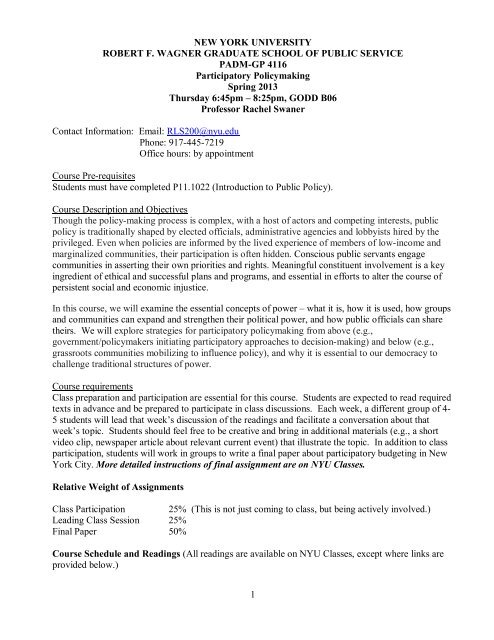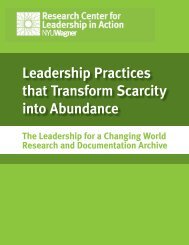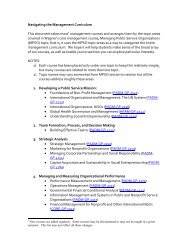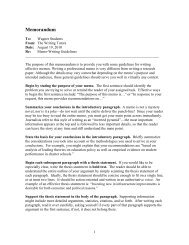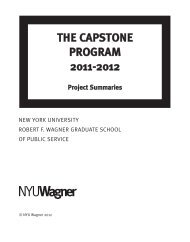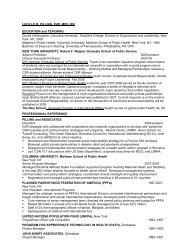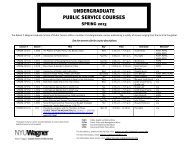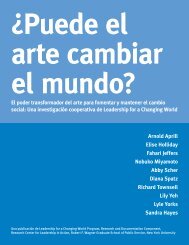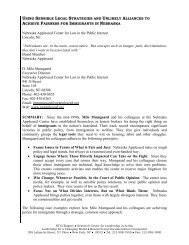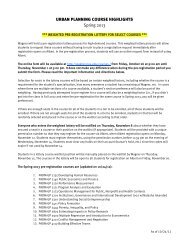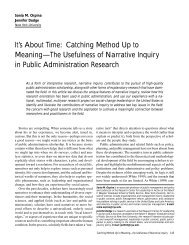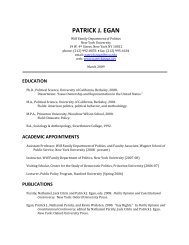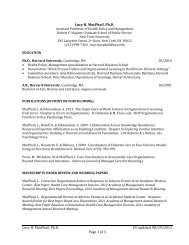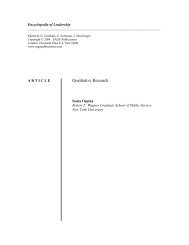Syllabus - NYU Wagner - New York University
Syllabus - NYU Wagner - New York University
Syllabus - NYU Wagner - New York University
You also want an ePaper? Increase the reach of your titles
YUMPU automatically turns print PDFs into web optimized ePapers that Google loves.
NEW YORK UNIVERSITY<br />
ROBERT F. WAGNER GRADUATE SCHOOL OF PUBLIC SERVICE<br />
PADM-GP 4116<br />
Participatory Policymaking<br />
Spring 2013<br />
Thursday 6:45pm – 8:25pm, GODD B06<br />
Professor Rachel Swaner<br />
Contact Information: Email: RLS200@nyu.edu<br />
Phone: 917-445-7219<br />
Office hours: by appointment<br />
Course Pre-requisites<br />
Students must have completed P11.1022 (Introduction to Public Policy).<br />
Course Description and Objectives<br />
Though the policy-making process is complex, with a host of actors and competing interests, public<br />
policy is traditionally shaped by elected officials, administrative agencies and lobbyists hired by the<br />
privileged. Even when policies are informed by the lived experience of members of low-income and<br />
marginalized communities, their participation is often hidden. Conscious public servants engage<br />
communities in asserting their own priorities and rights. Meaningful constituent involvement is a key<br />
ingredient of ethical and successful plans and programs, and essential in efforts to alter the course of<br />
persistent social and economic injustice.<br />
In this course, we will examine the essential concepts of power – what it is, how it is used, how groups<br />
and communities can expand and strengthen their political power, and how public officials can share<br />
theirs. We will explore strategies for participatory policymaking from above (e.g.,<br />
government/policymakers initiating participatory approaches to decision-making) and below (e.g.,<br />
grassroots communities mobilizing to influence policy), and why it is essential to our democracy to<br />
challenge traditional structures of power.<br />
Course requirements<br />
Class preparation and participation are essential for this course. Students are expected to read required<br />
texts in advance and be prepared to participate in class discussions. Each week, a different group of 4-<br />
5 students will lead that week’s discussion of the readings and facilitate a conversation about that<br />
week’s topic. Students should feel free to be creative and bring in additional materials (e.g., a short<br />
video clip, newspaper article about relevant current event) that illustrate the topic. In addition to class<br />
participation, students will work in groups to write a final paper about participatory budgeting in <strong>New</strong><br />
<strong>York</strong> City. More detailed instructions of final assignment are on <strong>NYU</strong> Classes.<br />
Relative Weight of Assignments<br />
Class Participation 25% (This is not just coming to class, but being actively involved.)<br />
Leading Class Session 25%<br />
Final Paper 50%<br />
Course Schedule and Readings (All readings are available on <strong>NYU</strong> Classes, except where links are<br />
provided below.)<br />
1
Class 1: January 31 – Introduction and Overview; Understanding Power<br />
<br />
<br />
<br />
Alinsky, S. 1971. Rules for Radicals: A Practical Primer for Realistic Radicals. <strong>New</strong> <strong>York</strong>:<br />
Random House.<br />
o “The Purpose”<br />
o “A Word About Words”<br />
Lukes, S. 2005. Power: A Radical View, Second Edition. <strong>New</strong> <strong>York</strong>: Palgrave Macmillan.<br />
o Chapter 1 (pages 14-59)<br />
Hayden, T. 2012. “Participatory Democracy: From Port Huron to Occupy Wall Street.” The<br />
Nation, March 27, 2012.<br />
Class 2: February 7 – Participatory Democracy; Participatory Budgeting Part 1<br />
<br />
<br />
<br />
<br />
<br />
Fung, A. 2006. “Varieties of Participation in Complex Governance.” Public Administration<br />
Review, Special Issue December 2006:66-75.<br />
Pateman, C. 2012. “Participatory Democracy Revisited.” Perspectives on Politics (Cambridge<br />
<strong>University</strong> Press), 10(1):7-19.<br />
Fung, A., and Wright, EO. 2003. “Thinking about Empowered Participatory Governance.” In<br />
Deepening Democracy, Institutional Innovations in Empowered Participatory Governance. Eds.,<br />
Fung and Wright. <strong>New</strong> <strong>York</strong>: Verso. Pages 3-42.<br />
Wampler, B. 2012. “Participatory Budgeting: Core Principles and Key Impacts.” Journal of Public<br />
Deliberation, 8(2):Article 12.<br />
Guest speaker: Jumaane Williams, <strong>New</strong> <strong>York</strong> City Council Member<br />
Class 3: February 14 – Participatory Budgeting Part 2<br />
<br />
<br />
<br />
<br />
<br />
Lerner, J., and Secondo, D. 2012. “By the People, For the People: Participatory Budgeting from the<br />
Bottom Up in North America,” Journal of Public Deliberation, 8(2): Article 2.<br />
Marquetti, A., Schonerwald da Silva, CE., and Campbell, A. 2012. “Participatory Economic<br />
Democracy in Action: Participatory Budgeting in Porto Alegre, 1989-2004.” Review of Radical<br />
Public Economics, 44(1):62-81.<br />
Taylor, K. 2011. “4 Council Members, Each With $1 Million, Will Let the Public Decide How It’s<br />
Spent.” <strong>New</strong> <strong>York</strong> Times. September 13, 2011. Available at:<br />
http://www.nytimes.com/2011/09/14/nyregion/4-on-ny-city-council-will-let-public-decide-somespending.html<br />
Sangha, S. 2012. “Putting in Their Two Cents.” <strong>New</strong> <strong>York</strong> Times. March 30, 2012. Available at:<br />
http://www.nytimes.com/2012/04/01/nyregion/for-some-new-yorkers-a-grand-experiment-inparticipatory-budgeting.html<br />
Guest speaker: Pam Jennings, The Participatory Budgeting Project<br />
Class 4: February 21 – Community Organizing Part 1<br />
<br />
<br />
Alinsky, S. 1971. Rules for Radicals: A Practical Primer for Realistic Radicals. <strong>New</strong> <strong>York</strong>:<br />
Random House.<br />
o “The Education of an Organizer”<br />
o “Communication”<br />
Sen, R. 2003. Stir it Up: Lessons in Community Organizing and Advocacy. San Francisco: John<br />
Wiley & Sons, Inc.<br />
2
o Introduction: Community Organizing – Yesterday and Today (pages xliii – xlix)<br />
Guest speakers: Christopher Kocher and Stephen Barton, Mayors Against Illegal Guns<br />
Class 5: February 28 – Community Organizing Part 2<br />
Delgado, M., and Staples, L. 2008. Youth-Led Community Organizing. <strong>New</strong> <strong>York</strong>: Oxford<br />
<strong>University</strong> Press.<br />
o Chapter 9: Youth First in Jackson Square! (pages 175-193)<br />
Sen, R. 2003. Stir it Up: Lessons in Community Organizing and Advocacy. San Francisco: John<br />
Wiley & Sons, Inc.<br />
o Chapter 2: Organizing <strong>New</strong> Constituencies (pages 24-47)<br />
o Chapter 3: Picking the Good Fight (pages 48-78)<br />
Class 6: March 7 – Participatory Action Research<br />
<br />
<br />
<br />
<br />
<br />
<br />
Right to the City Alliance. 2010. “We Call These Projects Home: Solving the Housing Crisis from<br />
the Ground Up.” http://www.cdp-ny.org/report/We_Call_These_Projects_Home.pdf<br />
Review: http://www.researchfororganizing.org/index.php?page=home<br />
Northridge ME, Shoemaker K, Jean-Louis B, Ortiz B, Swaner R, Vaughan RD, Cushman LF,<br />
Hutchinson VE, Nicholas SW. 2005. “What matters to communities? Using community-based<br />
participatory research to ask and answer questions regarding the environment and health.”<br />
Environmental Health Perspectives, 113 (Suppl. I), 34-41.<br />
Fine, M., Ayala, J., and Zaal, M. 2012. “Public Science and Participatory Policy Development:<br />
Reclaiming Policy as a Democratic Project.” Journal of Education Policy, 1-8.<br />
Ozer, EJ., and Wright, D. 2012. “Beyond School Spirit: The Effects of Youth-Led Participatory<br />
Action Research in Two Urban High Schools.” Journal of Research on Adolescence, 22(2):267-<br />
283.<br />
Fisher, C. 2011. “Implications of Participation and Equality in the Research Process for Health<br />
Promotion Practice: Domestic Violence as an Example.” Health Promotion Journal of Australia,<br />
22(2):119-123.<br />
Class 7: March 14 – Critiques of Participatory Policymaking<br />
<br />
<br />
<br />
Risner, G., and Bergan, D. 2012. “The Perils of Participation: The Effect of Participation Messages<br />
on Citizens’ Policy Support.” Journal of Public Transportation, 15(2):137-156.<br />
Irvin, RA., and Stansbury, J. 2004. “Citizen Participation in Decision Making: Is it Worth the<br />
Effort?” Public Administration Review, 64(1):55-65.<br />
Hauptmann, E. 2001. “Can Less Be More? Leftist Deliberative Democrats’ Critique of<br />
Participatory Democracy.” Polity, XXXIII(3):397-421.<br />
3


